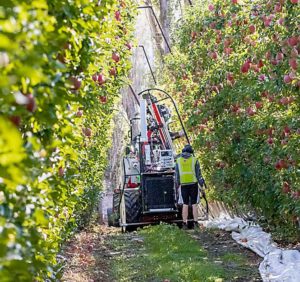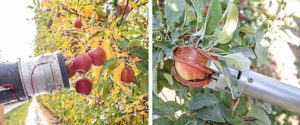Abundant Robotics, the tech startup that appeared to be leading the race to commercialize a robotic apple picker, has shut down.
“After a series of promising commercial trials with prototype apple harvesters, the company was unable to raise enough investment funding to continue development and launch a production system,” said CEO Dan Steere in a statement on July 2.
Earlier this week, the Hayward, California, company entered a legal liquidation process under California law similar to bankruptcy, Steere said in a brief conversation with Good Fruit Grower. Armanino LLP, a San Ramon, consulting firm will assume control of Abundant’s assets and sell off both physical and intellectual property for the benefit of creditors and shareholders, Steere said. All employees have been laid off.
He declined to comment further.
In the fall of 2020, Steere told Good Fruit Grower that small-scale commercial trials with one harvester had been going so well, the company was ready to begin building more machines and ramp up commercial custom harvest on a wide scale.
Abundant’s self-steering robotic harvester used computer vision and a vacuum end-effector to select and pick fruit, transferring it to a bin via padded tubes. The company estimated its machine could reach between 50 percent and 90 percent of fruit on trees, depending on canopy management.
Abundant’s departure leaves FFRobotics as the frontrunner in the robotic harvester race. The Israeli company operates a picker with multiple arms and “fingers” to grip, twist and pull fruit from trees.
The Washington Tree Fruit Research Commission has funded portions of both efforts, though Abundant was primarily propped by $10 million in Silicon Valley venture capital.
Tree fruit industry technology advocates called the news a setback to innovation efforts.
“It’s too bad because we definitely need automation,” said Dave Allan, a former orchard manager for Allan Bros. of Yakima, Washington.
Allan collaborated with Abundant on many early trials.
“At least I felt they were getting pretty close,” Allan said.
In the midst of an economic downturn, the fruit industry did not have the appetite to help move Abundant forward, Allan said. Meanwhile, outside investors must have wanted a quicker payout than the company could deliver.
Principal owners of Washington tree fruit companies were among the investors who likely will lose money because of the liquidation, said Jeff Cleveringa, head of research and development at Oneonta Starr Ranch Growers and a member of the Washington Tree Fruit Research Commission.
“It’s sad,” Cleveringa said. “I hope one of their investors picks up their technology and reroutes a plan.”
Meanwhile, the tree fruit industry has other innovation irons in the fire, Cleveringa said. There’s FFRobotics, a collaboration between the research commission and Western Growers in the Global Harvest Automation Initiative, and a broad partnership between industry stakeholders in Washington and the Netherlands called the Fruit Orchard of the Future.
“We’re not done,” he said.
—by Ross Courtney








Leave A Comment